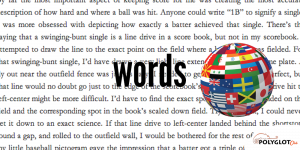Difference between revisions of "Language/Multiple-languages/Vocabulary/Must‐Know-Words-for-Polyglots"
< Language | Multiple-languages | Vocabulary
Jump to navigation
Jump to search
| Line 261: | Line 261: | ||
|[[wikipedia:Part of speech|part of speech]] | |[[wikipedia:Part of speech|part of speech]] | ||
{| class="wikitable" | {| class="wikitable" | ||
|[[wikipedia:Conjunction (grammar)|conjunction]] | |[[wikipedia:Conjunction (grammar)|conjunction]] | ||
|- | |- | ||
| Line 290: | Line 288: | ||
|[[wikipedia:Nominalized adjective|nominalized adjective]] | |[[wikipedia:Nominalized adjective|nominalized adjective]] | ||
|} | |} | ||
|- | |||
|[[wikipedia:Adverb|adverb]] | |||
|- | |- | ||
|[[wikipedia:Determiner|determiner]] | |[[wikipedia:Determiner|determiner]] | ||
Revision as of 18:56, 11 April 2019
Must-know words for polyglots.
Mainly about linguistic terms. Also other important things.
In progress.
Remember: you don't have to memorise them all in a single time.
If you are interested in terms, see https://glossary.sil.org/term
To know a relatively clear categorization of linguistics, see https://en.wikipedia.org/wiki/Outline_of_linguistics#Branches_of_linguistics
